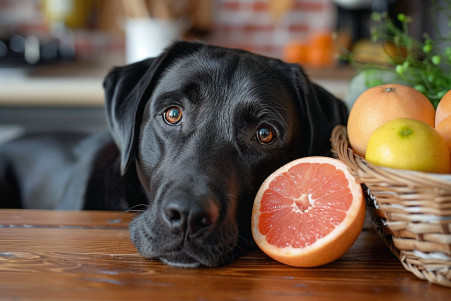My Dog Ate Grapes But Seems Fine: Understanding the Risks
31 March 2024 • Updated 29 March 2024

The response to a dog eating grapes can be a source of panic for many pet parents, but the truth is that the risk, severity, and even the timeline of symptoms can depend on a variety of factors, including the amount of grapes the dog ate and the size of the dog. Grapes can cause mild gastrointestinal upset in dogs when ingested in small amounts, but larger amounts can result in acute kidney injury within 12-24 hours due to the presence of certain toxic compounds. If your dog ate grapes and seems fine after eating just a few, you should watch them closely, but if they've eaten more, you should take them to the vet immediately.
Although the lack of symptoms after a dog eats grapes can be reassuring in the short term, it's important to know the risks and what to do based on the situation. By reviewing the latest studies, which include everything from case reports to toxicology findings to expert opinions, on grape and raisin toxicity in dogs, we aim to give you a complete picture of what to expect, when to get professional help, and how to handle this all-too-common canine mishap.
Is my dog in danger after eating grapes?
Grape and Raisin Toxicity in Dogs: Signs and Severity
Dogs that have eaten grapes or raisins may not show any signs of distress immediately after eating the fruit. However, this period of time may be short-lived, with dogs soon showing signs of toxicity. Early signs of grape and raisin toxicity in dogs include vomiting, lethargy, diarrhea, and abdominal pain and are typically seen within 6-12 hours of ingestion according to Wag Walking.
In more severe cases, dogs may develop sudden kidney failure, which can be accompanied by symptoms like increased drinking and urination, loss of appetite, and even neurological symptoms like seizures as noted by the American Kennel Club. The degree of severity can vary greatly, and it depends on a number of factors, including the amount of grapes or raisins a dog eats relative to their body weight and their individual sensitivity to the toxic compounds. Some dogs can develop severe toxicity after eating even a small amount of grapes or raisins. Unfortunately, no amount of grapes or raisins is safe for dogs because of the risk of toxicity.
It’s important to seek veterinary care as soon as possible since the longer treatment is delayed, the more time the toxins have to damage the kidneys and the worse the prognosis becomes. Even if your dog doesn’t show any signs of toxicity after eating grapes, it’s important to contact a veterinarian right away so they can provide guidance on decontamination and supportive care, which may help prevent the development of life-threatening complications.
The Toxic Culprit: Tartaric Acid and Its Effects
More recently, studies have pointed to tartaric acid as the toxic substance in grapes that causes canine poisoning. A report in the Journal of Veterinary Medicine notes that tartaric acid is found in high levels in grapes, raisins, and other grape products. The Animal Poisons Helpline says that dogs have a unique sensitivity to tartaric acid, which can lead to kidney failure and neurological issues.
Tartaric acid and its salts are also found in a number of other foods, pharmaceuticals, and cosmetics, according to Grady Veterinary Hospital, which also points out that this discovery may explain why dogs' reactions to grapes can vary. The levels of tartaric acid in grapes can vary based on the grape's variety, how and where it was grown, and how ripe it is. Understanding the role of tartaric acid in grape toxicity in dogs is an important first step in learning more about this potentially deadly danger to our four-legged friends.
Given this new knowledge, pet owners need to be on the lookout to protect their dogs. If a dog is exposed to grapes or other products that contain tartaric acid, it's important to get them to a vet as soon as possible to prevent serious, and possibly fatal, complications.
Emergency Response: What to Do If Your Dog Eats Grapes
If your dog has eaten any amount of grapes or raisins, it is a medical emergency and you should seek help immediately. Wag Walking recommends calling your vet or animal hospital right away. If you can't get to a hospital immediately and it's been less than 30 minutes since your dog ate the grapes or raisins, you should try to induce vomiting.
The ToeGrips for Dogs website suggests using a solution of one teaspoon of hydrogen peroxide per five pounds of your dog's weight to induce vomiting within 10 to 15 minutes. You can repeat this process one more time with the same amount of peroxide, but no more than three times in 30 minutes. If your dog hasn't vomited after three attempts, you should take them to a veterinary professional immediately, as this is a life-threatening emergency.
If the toxic dose was ingested, your dog may experience gastrointestinal upset and vomiting in the first few hours, with signs of kidney failure appearing one to three days later, according to PetMD. Treatment may include vomiting induction, kidney value monitoring, IV fluids, and activated charcoal. Hospitalization for 24 to 72 hours may be necessary for monitoring and supportive care. It's important to note that you should always follow the advice of veterinary professionals and not attempt to treat your dog at home without consulting them first.
Healthy Fruits That Are Safe for Dogs
Dogs need a well-rounded diet that includes healthy fruits to ensure they get the nutrients they need to stay healthy. The American Kennel Club lists several fruits that are safe for dogs to eat in moderation, including apples, bananas, blueberries, and watermelon.
Apples are a good source of vitamins A and C and dietary fiber, which can help with digestion. Bananas are high in potassium, vitamin B6, and antioxidants, which can help with muscle and blood vessel function. Meanwhile, blueberries are a great fruit for dogs because they're high in antioxidants and fiber, according to The Wildest. Watermelon is a hydrating, low-calorie fruit that's also a good source of vitamins A, B6, and C.
While these fruits can be good for dogs, it's important to make sure you don't give your dog any fruits that are toxic to them, including grapes, raisins, avocados, and cherries. Forbes Advisor warns that these fruits can cause serious health issues, including acute kidney failure. It's best to talk to your vet to find out how much of these fruits you can give your dog and the best way to do so.
Conclusion: Keeping Your Pet Safe and Healthy
The dangers of grape and raisin toxicity in dogs cannot be overstated. To protect our pets, it's important to be aware of the risks associated with these foods and to ensure that they are inaccessible to dogs. If a dog does eat grapes or raisins, it's important to seek veterinary care immediately.
By understanding the dangers of these fruits and the options that are safe for dogs, we can make sure that our pets are healthy and happy. This requires a commitment to prevention and quick action, but it's worth it to keep our dogs safe and healthy.


